Blue Blossom Journal


In September I had planned to begin work on my next book but I had an illness that prevented both that and making regular blog entries. I began writing that book (with a working title of "Gathering Plum Blossoms") in earnest in October and have be consistently researching and writing that book since then. While it is progressing nicely, my blog energy has been, for now at least, captured by that project. My mind is both consciously and subconsciously preoccupied with shaping that work.
I plan to release GPB in five stages and when the first volume is complete, I will announce that here and link to the published eBook. It is a book of poem criticism based on poems that were made interesting to me by students.
That being said, I miss writing in my blogs and I can imagine that I might suddenly place something here.
It is because of my students, their intelligence, curiosity, and warmth, that I write blog entries. That feeling has not changed since I retired, nor do I expect that it ever will change. Thank you for your inspiration.
Ezra Klein: "Towards the beginning of your book, you have this wonderful quote from James Baldwin where he says, 'I have met only a very few people — and most of these were not Americans — who had any real desire to be free. Freedom is hard to bear.' [The Fire Next Time, 1963] It’s not a new idea that freedom can feel bad. But it’s not an idea you hear that often in American political discourse where freedom is the word everyone wants to lay claim to. But you write towards the beginning that Americans have developed, quote, 'a taste for unfreedom.' And I know you’re writing that in a political context. But why might unfreedom feel good?"
Maggie Nelson: "Well, I think in the book there’s this truism that we all yearn to be free and sovereign and make choices and be in control of ourselves and fulfill our destinies when, in fact, a great amount of human behavior is interested in letting go of the burden of having to make decisions, of having the burden of having to be in control of ourselves all the time, I mean, all kinds of things. So I do think that the notion that the kind of sovereign, unencumbered self is the source of — I don’t even know if I would say happiness, but a certain kind of well-being I think is not all borne out by the way that we behave."
Ezra Klein: "What’s the relationship for you between freedom and anxiety?" Ezra Klein interviewing Maggie Nelson about her book On Freedom: Four Songs of Care and Constraint, 2021
The Ezra Klein Show: "Let’s Talk About the Anxiety Freedom Can Cause" (Oct 8, 2021)
1. ... and I have met few people who I think have any real desire to embrace truth — freedom and truth, really, are entirely linked to one another. Courage and fear, strength and weakness — these determine our distance or closeness to freedom and truth, both. This set of conditions, together with circumstance, the flow of luck, access to love, are the human condition.
2. "Thus, the first effect of existentialism is that it puts every man in possession of himself as he is, and places the entire responsibility for his existence squarely upon his own shoulders. And, when we say that man is responsible for himself, we do not mean that he is responsible only for his own individuality, but that he is responsible for all men." (Jean-Paul Sartre, "Existentialism is a Humanism," 1946) For Sartre, we do not choose freedom; instead, we are thrown into freedom from birth and to not embrace that, to instead make excuses for our choices and ignore that our actions have consequences for us and others is "bad faith." Acceptance and gratitude relieve much of the tension around the urge to flight, around under-the-blanket escape from a world that remains all-too-present everywhere around us. For Sartre, reality is brutal, unforgiving, without mercy and never coddles. But, to me, this is an egocentric view of things. Joy invites courage. Accepting that we are all wounded allows the gentleness of forgiveness. No, living is not a game. It is entirely serious, with real pain. Yearning to be un-free and living in an un-free state, well, that makes what is truly awesome into just a squandering of one's time on this planet.
3. If Klein has asked me "What’s the relationship for you between freedom and anxiety?" I would answer: to have anxiety in the world as it now is is quite normal and anxiety seeks comfort and comfort is not freedom.
On amateurs.
Back in my 20s and 30s, when I wrote a novel and wanted to be a novelist, of course I encountered in conversation the frequent "I'm thinking of writing a book, too" comment. As if anyone who chose to do so could write a book, or novel. Well, anyone can put words to paper but good creative writing is a skill very few can do. I learned that, as they say, "the hard way".
Then, years upon years as a teacher in a world that doesn't respect teachers because everyone thinks "I could do that, too, if necessary." My father said (I remember exactly where he said it: the off ramp to Afton, Oklahoma from the turnpike): "People become professors because they can't become anything else." Sigh. (He changed his mind later or, to put it more honestly, I changed his mind on this one. It wasn't easy.) Teaching well is a complex skill. We succeed at it to varying degrees but it isn't just intuitive and it isn't just telling someone something and maybe later testing them on it.
And then we began to see the days when Facebook, an amateur at news, replaced the professionals. Then, not just Facebook. Others, many others, with, eventually, Twitter becoming a major news source. News isn't just saying something happened (although the speed of Twitter is excellent for this). It is curated, evaluated, given context and focus. This is a skill set few actually have. There are necessary resources that few have, too, and these are, sadly, dwindling rapidly.
We have foregone experts (real ones) for influencers, micro-influencers, nano-influencers .... If it is accessible, quick to consume, brings a moment of pleasure or a (usually false) sense of discovery, well, we feel rewarded, they feel rewarded. The circle is closed.
How very dangerous to lose respect for those who excel at their skills and settle for quick and easy consumption, accurate or not.
I tried to teach my students the importance of credibility. But, honestly, I felt not just reluctance but hostility in the room from some. They had decided otherwise about the importance of credibility. Are they just too busy to do the work of being skeptical, critical, careful? Or are they too lazy? Or is learning being skewed towards other dopamine expectations: quick, pleasurable, easy, transitory, next one ... ? Recently I took a look again at Herman Hesse's The Glass Bead Game. How many people want to do the heavy lifting for a novel like that?
I was taught to treat gossip as gossip for what it is: likely inaccurate, motivated by an agenda, and often not the most important thing to say or hear about a topic. Yet I feel gossip and news have melded into one mess. We are crossing over because amateur content and professional content unawares, as if it doesn't really matter. It does.
And, I would like to add ...
Conspiracy theories give one a false sense of knowing more than others without onerous effort of deploying the critical skills that should be front-loaded, to measure the reliability of something.
RICHARD POWERS: ". . . I guess what’s happened [to describe my change over the years] is one kind of science continued to evolve in my interest into another until I began to see the kinds of science that have a very different kind of focus than the ones that preoccupied me when I was younger. I think if I were to give this an oversimplification, I was concerned as a younger writer, in my 20s and 30s and 40s, with the human sciences that amplify our ability to control and master and manipulate our situation here and to understand ourselves. And in my 50s and 60s, I’ve become interested in the humbling sciences, I guess I would say, that point our attention away from ourselves and onto other living things.
EZRA KLEIN: I love that idea of the humbling sciences. . . .
RICHARD POWERS: Yeah. And you know, amazement and wonder are very close to humility in my own emotional wheel. The more astonishing the world around us becomes, the more we have to share the limelight with these other things that are just mind boggling." Richard Powers interviewed by Ezra Klein
THE EZRA KLEIN SHOW — Transcript: Ezra Klein Interviews Richard Powers — Sept. 28, 2021
A few things:
I've been away due to an illness.
College, oh amazing students, is the time to learn to think big. Really big. Thinking big is thinking beyond your fears and immediate goals (the selfish ones and the necessary ones) to discover in a direct, visceral way how very very big the world around you is. Amazingly big.
If you have not found that yet, find it.
If you have found it, don't forget it.
Daily pressures will narrow your window of sensibility. This is a natural and inescapably and frequent part of your daily life and the small world of to do lists and future worries that are part of it can get you hopping from on task to the next, nibbling away at your soul. Tend to your growth and success, but remember those in your life, and look towards the most distant of horizons you can image, with confidence and, yes, amazement. This, I believe, will make you, and those who share your world, happier (usually).
I want to amend one statement by Powers: ". . . amazement, wonder, and gratitude are very close to humility . . . "
Richard Powers most recent publication is a novel about a father and son called Bewilderment.

The Ezra Klein Show https://podcasts.apple.com/us/podcast/the-ezra-klein-show/id1548604447
"B.5.4 In the longer term, sea level is committed to rise for centuries to millennia due to continuing deep ocean warming and ice sheet melt, and will remain elevated for thousands of years (high confidence)." Ipcc: intergovernmental panel on climate change*
Sixth Assessment Report (AR6) - Climate Change 2021 - The Physical Science Basis Summary for Policymakers - https://www.ipcc.ch/report/ar6/wg1/ - *The Intergovernmental Panel on Climate Change (IPCC) is the United Nations body for assessing the science related to climate change.
The UN came out with its sixth assessment of climate change, the first since 2014.
It attracted news attention for about one day.
Long term, climate change poses the greatest danger by far to the things and people we hold dear and the way we hope to live. Yet, so far, we are failing to meet the challenge. At some point long term scenarios resulting from climate change will arrive to our "now." That they might not ever arrive on our doorstep is a chimera of epic proportions, a folly that will prove profoundly, drearily, enduringly painful, and perhaps ultimately fatal.
When I try to think over the near existential challenge of climate change at a meta-level, these three things come to mind as perhaps the most essential:
We can wake up early and reduce future pain, or we can wake up late to find we must forever live in a world raging, a monster of a home born of our unloving, fantastic thoughtlessness. It won't be just a heat wave here and there, a fire here and there, a flood here and there. We and our environment coexist. Social conditions and environmental conditions coexist. When one is full of maladies, so will be the other. There is no "here and there" — this will be everywhere. This might sound like dramatic language, but it is simply true.
Those of you who know me know that I am not naturally strident in my tone. I am not trying to be harsh now, either. I simply set out on this night to write this entry as honestly as I possibly could, so that I wouldn't regret it later.
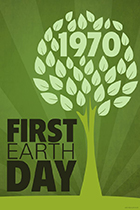
April 22, 1970
"The whole history of the progress of human liberty shows that all concessions yet made to her claims have been born of earnest struggle. If there is no struggle, there is no progress. Those who profess to favor freedom and yet depreciate agitation are men who want crops without plowing up the ground. They want rain without thunder and lightning. They want the ocean without the awful roar of its many waters. This struggle may be a moral one, or it may be a physical one, and it may be both moral and physical. But it must be a struggle. Power concedes nothing without a demand. It never did, and it never will." Frederick Douglass on gaining access to power
NPR podcast: Throughline, July 15, 2021 "The Most Sacred Right" (2020)
Audio of the above
"The contagion is spreading, extending and over-leaping geographical lines and state boundaries. And if permitted to go on, it threatens to destroy all respect for law and order not only in the South, but in all parts of our country - North as well as South. When the poison of anarchy is once in the air, like the pestilence that walketh in the darkness, the winds of heaven will take it up and favor its diffusion." Frederick Douglass "Lessons of the Hour" or "Why the Negro is Lynched", a rumination on anarchy's spread
NPR podcast: Throughline, July 15, 2021 "The Most Sacred Right" (2020)
Audio of the above
NOTE: I have found this entry exceptionally difficult to write. The connections between Douglass and these thoughts, and between the two main thoughts themselves, are there but are not yet explicit enough. But here it is. This walks around a profound inner conflict in me between a compulsion to act for the benefit of others on the one hand and my own deep emotional and spiritual currents derived from Japanese wa (social harmony), Confucian ethics, Buddhist detachment, and Daoist yin-yang balance.
It is almost a given, as established via media coverage perhaps, that we live in an era of "partisanship." Media loves to find (and maybe exaggerate) strife, friction and fights among groups.
But I am not so sure that this is a good description of the current state of affairs. Yes, if we take any common dictionary definition of "partisanship"—for example Miriam-Webster has "strong and sometimes blind adherence to a particular party, faction, cause, or person"—and we look only at our public sphere (via media), partisanship seems to be highly prominent at least within circles of discourse.
But, in fact, I don't think we embrace the word "partisanship" with its dictionary definition. I think it has evolved in usage to mean, basically, "us versus them". For example: Brian Stelter writes in an August 7, 2021 CNN article "Jason Zengerle, writing in this weekend's edition of The New York Times Magazine, says this era [of negative partisanship] is "one in which political allegiances are determined less by affection for one party than by hatred of the other." Here it seems to me that "group" could be very easily and accurately substituted for "party" in that sentence.
So, I think the current fights prevalent among us are not party-related (Republican vs Democrat)—which would indeed be partisanship.
Rather they seem to be between a group formation "instinct" and a modern ideal that is rooted in the relatively recent notion of individualism. The former is a group with a strong leader and hierarchies where everyone has a role but not equal access to wealth or freedom. It is efficient in decision making and carrying out action and is economically productive. The other is a group embracing an idea of equal rights for all its members, refusing the power of an executive at the top, and acting instead from consensus (once reached). It is fractious and inefficient in its road to decisions. (“We hold these truths to be self-evident, that all men are created equal, that they are endowed by their Creator with certain unalienable Rights, that among these are Life, Liberty and the pursuit of Happiness.” Declaration of Independence, 1776).
The latter allows, even needs, a pluralism of ideas. The former works best with a single, dominant ideology. The latter distributes and decentralizes power through rules and laws and social support, and I think it is fair to say that as an organizational principle it is messy. The former, at its core, decides power through winning over others via whatever method works so its goals are simple and easy to visualize.
Each has its place.
The question is, at the national level, what do we in America really want? Each has solutions so the issues are, more accurately, about when is one better than the other and what place should each occupy? These, I think, are the issues rather than which way of organizing a group is the best between the two.
This country has always been a cult of winners. It honors, too, the individual acting on its own judgment rather than following the crowd. These two things need to be kept in mind, I think. They run deep and silent in the American spirit.
But the colossal clash between these two titans of social organization and social responsibility is not what is on my mind. These are just thoughts on the way to the below topic, one deeply troubling to me:
In the vitriol and strife of today's America I see a collapse of confidence, at the level of the individual and the nation in the meaning of life. A listlessness.
I think in this rudderless context, just possibly, a critically large number of us subscribe to group-ism (tribal affinity) to experience a sense of belonging. As an outcome of that, we seek to assert our group over others, even, if possible, to reduce or remove other groups. This seems instinctively like a way to reverse an inner sense of helplessness. We are fighting for meaning, and in so doing, we are carrying on a fight that has, ultimately, no prospect of creating social stability—it is meaning for me, not meaning for us+other.
Personally, I believe this red-hot web of schisms is because we have forgotten how to love. It does not seem natural or obvious to work to allow others to thrive alongside us. Perhaps we never knew how to do this but at a time of rich resources it didn't seem as apparent. Perhaps "enough for everyone" has only floated above us as an ideal, or an idea. I am not nostalgic for a social norm that tells us to love our neighbor and claims that we will be rewarded for doing so. My concern is deeper than that: I think we do not understand love anymore. Even saying this sounds "wrong" — as if even discussion the relevance of love in society-building is naive or irrelevant. That, to me, only shows how far we have drifted from knowing love and its power. We only watch stories about it; stories that also don't understand it.
Instead, we (not us in the privacy of our rooms but us in the public sphere of discourse and media) seem almost fetish-ly enthralled by the idea that life is a zero-sum game that operates in a loveless space.
We need to find our way out of this dead-end thinking and acting.
* (completed and posted July 22, when I was able to restore access to my web construction software)
Interpretation and understanding.
I was listening to a newscast about the difficulties Facebook faces when trying to decide whether to block an account, remove content, add a warning, or whatever.
It is a fairly natural thought, when trying to understand what someone "means" when they say something, to guess at the intention they have behind the comment. This "intention" is estimated across a huge range of things ("thoughtful" "careless" "bitter" "playful" "from an educated perspective" "prejudiced" and so on). Here I am just thinking of one of those qualities: was the comment said with seriousness or was it a joke? When making quick interpretive decisions of someone's comment, we treat this as a simple conclusion and just move on with the conversation ("probably serious" "seems like maybe it was a joke"). Yet, when the topics are sensitive, don't we all know the cleverness of the comment that is said like a joke but seems like it is actually serious? ("Say hi to my puppy!" ... "I hate dogs — just kidding.") The "undecidable" comments in just this one area of interpretation are not only fairly common but can be made at key times. Do we remember this?
But Facebook has a problem that is an order more difficult that deciding the intention of the person who made the comment. They can't censor based on THEIR conclusion of the speaker's intention. They need to, instead, consider how the READERS will conclude the same point. Their concern is not "What did that person really mean when they said that?" Rather it is, "What will the readers think that person really meant when they said that?" And ... well, OF COURSE ... the are millions of readers so it isn't just "readers" but rather "will there be enough readers disturbed in enough ways to warrant removal or a warning?"
This seems to me related to the classroom concern over "triggers." Should we who teach literature and philosophy avoid ALL discussions so as to protect the ONE person who might be triggered by a comment? Of course not, if only for the practical reason that the instructor cannot know what a trigger might be for a given, specific someone. Even that someone might not know.
But that is not the question we who are teaching not objective factual information but issues around the human condition and how to think of it confront; rather, we need to decide whether a certain discussion has enough value in proportion to the risk of triggering. We can't know the risk, but we can have, perhaps, a general sense. But "general" here probably means "most others (colleagues? chairpersons? students? administrators? general public? an activist group?) would think our judgment was reasonable." This is NOT a judgment tied to the reality of the moment in the classroom; it is tied to social norms which are changing and which are not applied consistently but according to circumstance and group.
But, to be honest, we can't even know the discussion's teaching / learning value either. For some students, perhaps many, that discussion will not be very valuable but it might be highly valuable to one or a few. We can't know. And to whom are we trying to teach? That is truly a moving target depending on the moment.
So, in the end, we instructors , having no choice, strike a balance between what we think is the value of the discussion and what we think others will think about our concern (sufficient, insufficient) for our students' mental well-being on the point of triggers.
This is one of many reasons that, in my opinion, teaching is an act of faith. We believe (we don't know) that what we teach and how we teach it will have value to others but we can never truly confirm this and certainly cannot determine how many or in what way and, too, we definitely cannot achieve an accurate calculus around the issue of triggers.
Yes, I know there are other important aspects to this: the instructor's personal attitude towards triggers, instructor fear of controversy, a student's sense of entitlement through the blurred boundary of religious believes that provide a type of discomfort that differs from traumatic events. To name a few.
But what I want to say here in this entry are these two things:
First, interpretation is not simple. It is the very core of understanding. Even so it seems to be thought of—generally and unfortunately—in far too naive a way. It is just so simple (perhaps necessary as a practical matter?) to uncritically believe we understand others more or less correctly more or less most of the time. I doubt we do. I think we can do much much better in understanding others.
Second, and this is really the reason I wrote this entry, I see in our world a tension between trying to understand another person and getting from that person what one wants. I see a breakdown in honoring the value of understanding on the one hand, and, on the other, a near fetish-level interest in strategies to get what one wants out of a situation or individual. In short I see an individualistic approach to thinking about a problem rather than a calculation of how to benefit another, or one's group, or another's group for that matter.
This approach to problems will not end well for our planet—not just human civilization but everything living on this planet.
To those of you in the middle of making your future, finding your best, solving personal problems, please remember that any successes your might achieve can be erased by problems of our wider world.

New York Times podcasts
Day X
"…the kind of [Zen Buddhism] practice we stress thus cannot become too idealistic. If an artist becomes too idealistic, he will commit suicide, because between his ideal and his actual ability there is a great gap. Because there is no bridge long enough to go across the gap, he will begin to despair. That is the usual spiritual way. But our spiritual way is not so idealistic. In some sense we should be idealistic; at least we should be interested in making bread which tastes and looks good!" Shunryu Suzuki
Zen Mind, Beginners Mind (1970)
Magic. Magical thinking. Mono no aware. Trauma and trauma recovery. Poetry. ...
When someone dreams big—bigger than that someone's possible—is this beautiful or sad? To advise saying, “Be realistic.” Is this kind or cruel?
In my courses, I taught that the sensibility of "mono no aware" (sometimes translated as a Japanese type of "pathos of things" or "ah-ness of things") can be thought of, in ones of its manifestations, as the observer knowing more than the subject observed, of the observer knowing that subject's fate, that subject's smallness in the face of fate, that subject's tenderness, its fragility. This thoughtful and emotional gaze and connection is a type of love with which the observer considers the current state and future state of the subject observed, the coming wave of fate.
As a teacher, I understood my task as to inspire dreams but also provide practical, realistic evaluation, feedback, and advice. And so I was often in the difficult space between honoring the value of dreaming big and practical choices. Is it more honest, really, to encourage a student to try something that you believe is probably out-of-reach? Instead, is it more honest to tell the student it is better to embrace their Plan B and give up the dream? Because, in truth, we teachers do not know who can succeed. Students constantly surprise with their energy, their discoveries, their successes. Yet we also are trusted, rightly, by students to advise well.
There were times when sense of mono no aware for a student would latch onto my heart and not let go. It is one of the most painful of moments for me.
...
Okay, so it is easy to say that magical thinking can be very dangerous. The Japanese believed they could defeat the West in WWII simply because their spirit was strong. Some believe Trump was elected president. Cults and conspiracy theories warp good judgment: 907 people took their own lives at Jonestown.
Yet trauma erases a sense of security, including a trust in others or the world in general that nothing bad will happen. To live without dysfunctional levels of unwarranted fear in daily life, neurologically speaking, requires neuron erasure (forgetting), a sense of hope, and some illogical but necessary psychological buffer zone between self and the external world: trust, belief, magical thinking. Danger is real. We are fragile. It is true. Yet the power to dream, and dream big, is one of our most awesome and remarkable abilities. Dreams shape our lives, and can improve our lives.
Films transport us magically into another world, away from this daily world that suggests dreams will never come true. All narratives, when they move us, do this — they restore our spirit, give us courage, hope. Narratives, in essence, are magical invocations with which we choose to participate. In a way, all stories are love stories in the sense that the subject state of love creates a world that others cannot see. Stories of fear and conflict usually take as their adversary those entities that say magic does not exist, cannot exist within one's heart or anywhere else.
We are part-body, part-dream. If we deny our dreams, we will kill our bodies. If we do not acknowledge the configurations of reality within which we must move, we will complicate our situations.
Effective speakers (writers? artists? musicians?) spin magic. Listeners, rapt, fall into their words, their worlds. Perhaps the single most important discovery for me in my quest to become the best teacher I could be was to come to believe that teachers are not speakers. Perhaps we, too, spin magic—but not around us or about us; rather, the magic of the world sets down roots within the hoping or waiting-to-hope hearts of our students.
"Joyce is right about history being a nightmare—but it may be the nightmare from which no one can awaken. People are trapped in history and history is trapped in them." James Baldwin
"Stranger in the Village" (Oct 1953)
Two semesters ago, I began the term in each of my classes with an exercise on "cancel culture"—they listened to a podcast, wrote their opinions, then shared. This was in part to build the classroom community (since it was a Zoom class, not in-person) but it was also to raise the alarm about the downside of "canceling" someone, or at least raise thoughtfully the issue as to when it might be appropriate to cancel someone and when a more proportional response was better.
As a teacher interested in equity and accessibility, I try to create a learning environment that does not privilege some over others. Since my grade school year at least, my sympathies have been with the underdog. I don't know why, but this feeling is genuine and consistent, and still fully with me. I was bullied at school and in my neighborhood, but didn't know to think of it that way. I just knew to be careful about some people, ignore some comments, refrain some saying certain things, not expect inclusion, and focus on the enjoyment of learning. It is likely that this, even today, has a heavy hand in my fate, long and short term both.
In my personal mythology, my father was a great man. He is now gone from this earth but not from my personal universe. As I got older and understood the world better, his stature, and my respect for him, increased.
My father was a moderate Republican and good citizen. Compromise and persuasion were his creed. Hard work will be rewarded. Capitalism can measure accurately the value of one's contribution to society. Serving others is the finest of activities.
When I was able, I registered as a Democrat, because, in my judgment (and isolating me from my mother, sister and social circles), Democrats had a greater commitment for inclusion and equity, and the underdog.
This was never a problem between my father and me. We were both moderates. We both believed in compromise and persuasion. We both thought it was necessary to "reach across the aisle". I wanted to be a diplomat. "Bipartisanship" was nearly a religion for us.
I left the teacher's union after many years of service, some of it in leadership, because of their drift towards harsh negotiation tactics rather than trying to understand the needs of the other side. I do not regret this decision.
But my many hours spent at the dinner table learning about and debating politics, my roots in a white agricultural evangelical town—my personal history—doesn't matter. Yes, I am trapped by it but I am, for now, bipartisan no more. Perhaps I could be called "proportionally partisan" (still imprisoned in my upbringing)—because I do reject passionately the strategy of "shock and awe" in that we should engage adversaries with the least amount of violence needed to attain our goal, not with the goal of eliminating our adversary (slash and burn). East Asian belief in cosmic and social harmony, though not born into it, runs thickly in my blood, even more than some East Asians I know.
While the ideal of compromise is beautiful, while the long term value of compromise is real and nearly always the best solution, I think we are at the cusp of losing democracy. So, dear father, I must at least for a time, set aside a value that is so very important to both of us. That connected us. That is part of our kindness and warmth. And I think, you, too, might join me in this decision. You were an isolationist before WWII. You said that was a mistake.
You said that you, and the world, were too slow to recognize the danger of the Nazis. You had everyone you could possible persuade read "The Rise and Fall of the Third Reich". Okay, I never read it but you lectured me enough on its contents. This is that time. It is not a time to be incredulous that democracy is at risk. It is time to protect voting rights, to fight for inclusion, to take a stance against racism, to admit that there is not a honest partner with whom one can try compromise and persuasion. One side has its knives out. Not its ideals.
I love you, father. Rest well in your grave. This is not your fight. You fought your fights. The responsibility has shifted from your generation to mine, and others. Thank you for your big heart, your logic, your sincerity. In a dangerous world, this gives me light.

My roots, from space
•
American Isolationism in the 1930s
•
For a debate on bipartisanship — The Argument (podcast). ‘Republicans Are Very, Very Close to Driving Democracy Into a Ditch.’” The New York Times, May 26, 2021, sec. Opinion. https://www.nytimes.com/2021/05/26/opinion/biden-mcconnell-bipartisan-infrastructure.html.
•
On right-wing extremists embedded in German governmental structures, echoing events of pre-Hitler Germany and similar goals for right-wing extremists in America — Katrin Bennhold Katrin, Lynsea Garrison, Clare Toeniskoetter, Kaitlin Roberts, Larissa Anderson, and Mike Benoist. “Day X.” The New York Times, May 19, 2021, sec. Podcasts. https://www.nytimes.com/2021/05/19/podcasts/far-right-german-extremism.html.
Today, after 30+ years,I finished my last formal class period of teaching at my university. Thank you to all the students, those who were wonderful, those who were less wonderful, those who were difficult—all of you taught me things I could not learn on my own. It's been very very good.
Primal scream.
Much earlier I shared a podcast about COVID dreams, and later some of my own COVID dreams (which continue). In between those was the insomnia phone calls as people, late at night, shared their inner feelings about the pandemic.
A couple of days ago, I listened to the NYT’s “The Daily” podcast where they had opened the phone lines to parents and how they feel as they try to be both employees and parents at the same time.
The outcome seems obvious: they are frustrated, angry, at a loss, tired, despairing. But the podcast broke through these expectations by simply sharing the direct voices of these people.
How tired they are.
And listening, I thought first of my students and their challenges, then of myself and my challenges, then of my student’s parents. Regardless of our political points of view, few of us are free of (crushing) COVID fatigue, and the specific challenges the pandemic brings, little and big, clearly felt and vaguely felt.
The podcast ends in an upbeat way that, for me, sometimes sounds too manufactured and sometimes just seems genuine. But the “story” laid out by the podcast (endurance with an end in sight, even if distant) isn’t surprising or even the point.
Just voices.
Voices.
Like cellos reaching deep into the soul with pain and beauty. Lives being lived in one way or another. Daily decisions, struggles, ordinary and exceptionally awesome, unsettling, moving, in their many sounds of humanity as it thinks, struggles, feels, keeps going.
I cannot replace here with metaphor the essential quality of those parental voices, speaking into a phone or microphone.
.png)
The Silent Scream by Anju Rajan
Apple Podcasts. “The Daily: The Agony of Pandemic Parenting on Apple Podcasts.” Accessed April 26, 2021. https://podcasts.apple.com/us/podcast/the-agony-of-pandemic-parenting/id1200361736?i=1000517376411.
"Three generations of imbeciles are enough." Supreme Court Justice Oliver Wendell Holmes,
justifying the forced sterilization of Carrie Buck in 1927
The podcast made me think of the below, even though the connection is hardly direct. But listening to the minister's voice (Pastor Robin Lutjohann) ... his way of talking is just so natural and simple. (I don't need this podcast link for my entry, but the podcast was good for its own reasons, so I'm sharing it.)
And so, ...
It seems to me there are, broadly speaking, two ways of teaching, at least within the humanities: to set an example and invite others to follow or to think together. It is natural, as a college professor, to set oneself apart: "These are the things I know that you do not know. This is what life within my field is life. This is what the intellectual path can be for you. Come join me." This is the "invitation / inspiration" model. Diction tends to be high-order, sometimes put-offish and snobbish but attractive in its own way. Even seductive at times. There might be power displays. (Whisper-whisper: There is an inner power circle ... Do you qualify? ...)
Yet I am in the camp of Pastor Lutjohann: I am sitting next to you. We are thinking together. I am not far from you. I am not just speaking, we are speaking together. I will use language that connects us, rather than setting myself at a distance, inviting you to cover that distance.
Both work. Both can be, and are, abused. To teach well, it is probably a good idea to find out which is more naturally you or to at least know which you are using when you are using it. I would just say, hmm, it probably isn't wise to expect much in the way of accolades if you choose the "sit together" model because both colleagues and students have pride and both like to think they are association with great others.
Humility deserves respect and admiration. Humility comes out of gratitude and gratitude is fundamentally a peaceful posture. Our world has very little peace.
PS: This journal is dear to me. But, for now, I am spending my days sitting with my students. At least, I think I am.
COVID dreams. They are pretty frequent. Usually I am on a train, or a pathway, or a plane somewhat lost but thinking I can find my way. In the case of the plane it often lurches or dives downwards and I think I will die. Last night, a different dream. I was in an underground garage, pulling out of a parking place. Perhaps it was after a concert and everyone was trying to leave at the same time. I began to pull out, saw another car pulling out, considered waiting but that seemed unnecessary and troublesome. So I just went. Someone in a car in front of me that I hadn't seen, and the person driving the car behind me, both yelled at me for not waiting for them. I felt I had done something wrong but not THAT wrong. We drove through the parking lot up to the surface. But then, on the surface, they boxed me in. I couldn't get away. They got out of the car, were in my headlights, and I knew they were going to drag me from the car and give me a horrible beating.
Teaching. (Now real world stuff.) I want to teach. Many of my students--the semester is beginning--want to learn. But we are all tired. The tiredness seems to be stronger than our desire to teach or learn.
Time. Where is it? I feel everything is on pause.
Last week I taught the last "romance" class. I taught this class 17 times, each time hoping to convey this essential thing: love asks that we understand someone from their perspective. I will never know if I have really communicated, taught, even one student this thing even though once someone said to me, "I finally understood this class. It is about everything. It is about life." Perhaps, here and there, I succeed at sharing. I like to think that person heard what I care so much about. But mostly, honestly, I just think I am trying but the "other side" is mostly not.
Still, teaching has brought me in contact with the thinking of many others—youthful thought, mature thought, mistaken thought, inspiring thought, great thought—and this has made my life full of colors and mountains and valleys.
Teaching has also taught me how to have faith and the importance of it. This is in-and-of-itself a good thing, but it also, usually, keeps the depression bears are at arms-length.
Also teaching created in me a desire to be authentic in spoken and written word. I like to think I have made some progress in that direction but I have also come to the bitter knowledge of the dishonesty within me. I have, without doubt, a much deeper sense of how difficult it can be to know what honesty is.
Teaching is the natural order of things of my heart and spirit. Needless to say, it is joyful: "Look, the world is wondrous." When I teach, some invisible someone—perhaps that is just me—completes the magic formula, and the angels sing. At the same time, every teaching act, I feel, fails in some essential way. If what I send arrives in just the way I send it, no learning occurs. The receiver must refuse my present in order to make their own discoveries. If I occupy someone's mind, I hinder learning. So, in the best of situations, I offer a present that will be noticed but not accepted. I am only soil, not plant.
The "romance" class was the most frustrating of my classes, for me and the students, both. But only the Oe Kenzaburo (thank you dear and honest and loving and intelligent writer) class is more cherished by me. I will not miss teaching it, I don't think. It has come to a natural end. But that it is now over is a strange moment in this long, tiring, inspiring, desperate effort to teach well. Goodbye dear class. Goodbye all 17 generations of dear students. I laughed with you, worried with you, was angry at you, became close to some of you. Goodbye. Sail your ships and be proud.
"Nothing vast enters the life of mortals without a curse." Sophocles, as quoted in "/the social dilemma_" Antigone (chorus)
While the agenda of this documentary is too heavy-handed for comfort (for me), the soundtrack too prejudicial, and some of the visualizations cheesy, it is deeply thought-provoking and introduces topics I think we all should be, must be, concerned about. I had this same reaction when I first saw Al Gore's "An Inconvenient Truth" (2006, on climate change) and read Michael Pollen's The Omnivore’s Dilemma (2006, on the food industry).
"/the social dilemma_" (2020) is a call to arms for an ethical reconsideration of the role of social media in culture. To my mind, "post-truth" "tribalism" "silo thinking" "emotional underdevelopment" "sentimental (wishful) thinking" "post-modern fatigue" are all inviting us to walk a path we cannot walk if we wish to have a future on this planet that is acceptable to us.
To put it another way, there is a fog in my classrooms that did not used to be there. And it seems, at least for now, that the fog is winning.
Reading together with my students Oe Kenzaburo's "Echo of Heaven" (人生の親戚)I asked them to also read a Yeat's poem ("The Second Coming" 1919) that he mentions. This poem has haunted me. It is the stuff of nightmares. Over the years of teaching Oe's, each time I encounter the poem, it grows one size larger, one tone darker, one mystery greater. Fear is private. I don't know if my students shuddered when reading this or didn't care. I care.
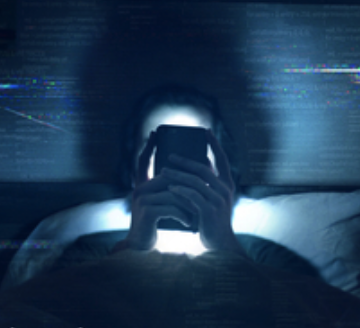
Detail from the promotional poster for "/the social dilemma_"
When I teach I try to let only true things (as I understand them) escape my lips. I try to embrace life. I try to love life and the things in it. I try to show this to my students. I want them to see the wonder of life, and to gather power. This is how I want to be. I think I teach dimly but well. I am exhausted from this work. And so I haven't said this in quite the right way. But, during meditation I suddenly felt I needed to say this. I wish them all well.
Yea, though I walk through the valley of the shadow of death ...Psalms 23, Bible
But, should we not think, now, in terms of action and conviction?
Rage, rage against the dying of the light
Dylan Thomas, Do not go gentle into the good night
I feel apologetic for being in a sentimental, philosophical mood.
But the country is on the eve of an election, not knowing what will happen.
At the most fundamental level of intuition I simply have no genuine sense of whether I—whether we—have over-worried or under-worried. The days will play out in their "brutal reality" (Sartre) regardless of how little or how much we wish, think, guess, hope, fear.
May some god, somewhere, help us all.
Last week I used Psalms 23 as an example in a class. Not one of my students had heard of it. That called up something ominous inside me.
Ghosts and facts dance together.
It has been a long week.
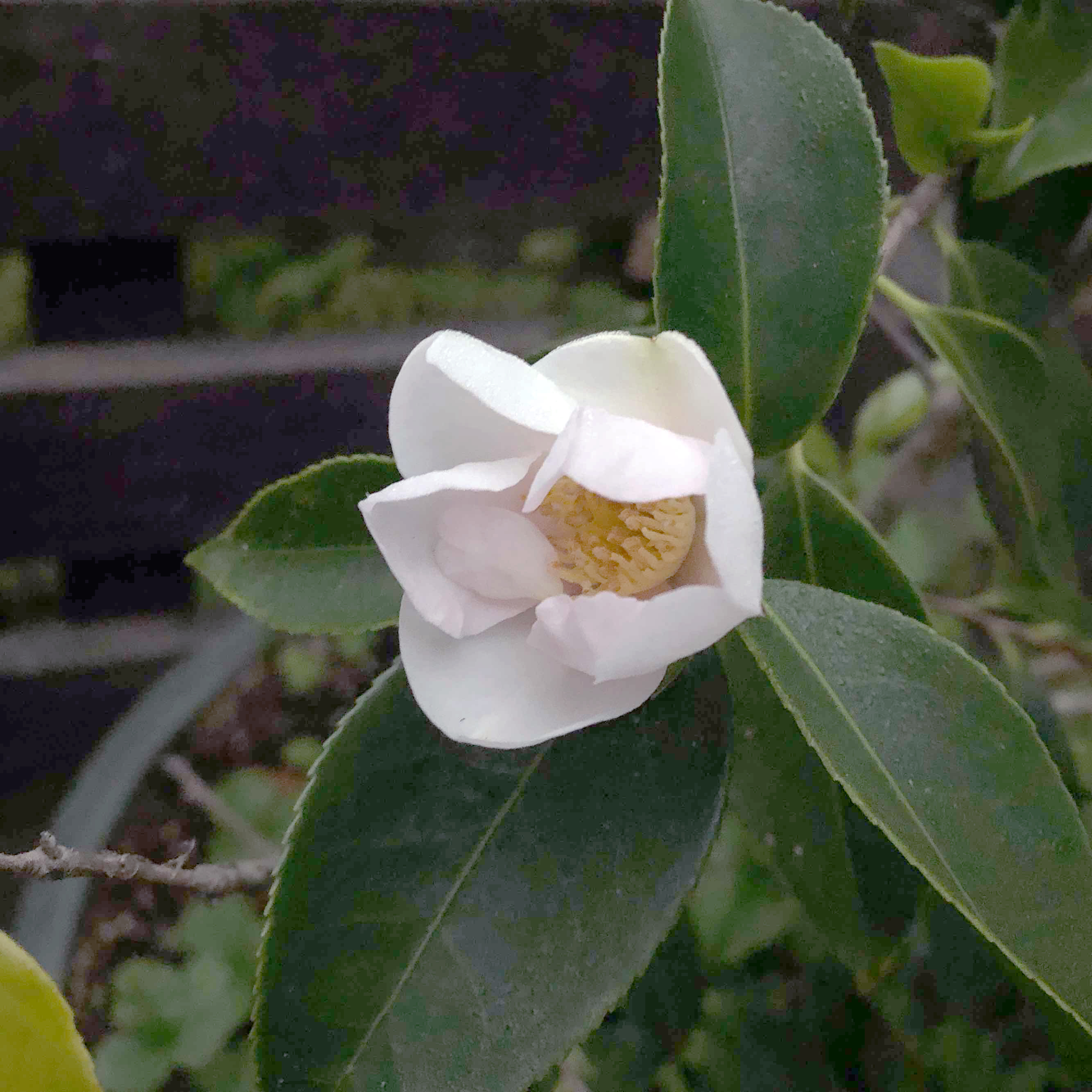
A bloom at my house,
on a rhododendron we call "Hope"
Vote.

Plate 43 from 'Los Caprichos': The sleep of reason produces monsters (El sueño de la razon produce monstruos) – 1799 – Goya (Francisco de Goya y Lucientes) The Met
"Bloom where you are planted" ... "Fleuris là où tu es plantée"
I heard this from a teacher discussing her advice to students. Probably because I am not Christian, I had not heard this before. But, at the moment she said this, I silently said "Yes." Because this is it. This is Zen. This is joy. This is what, at the very basic level, I seek to teach. In my words, "Make something interesting, don't wait for interesting things to come to you." For me, joy comes from this posture. All things under the sun, well not all things, glitter with an invitation to delight in them. Bloom, please bloom, and when you do, it makes us bloom, too.
The president is in the hospital with COVID. The election is undecided. The world is full of danger and the climate shifts in gigantic ways
Bloom. Oh, bloom.

a gateway perhaps
This podcast reached into the private thoughts of people who struggle with these COVID times. I asked my students to "check in". They will not talk like this, but I know that beyond their words to me, for some, are things unspoken. It hurts.

Radiolab: Insomnia Line (9/25/2020)
Ruth Ginsberg has passed. I feel such gratitude for her passion and intelligence and courage. Like many great people, she has helped keep the world from falling into hell. May her spirit find light and life in others who also have vision and courage and strength. People like her live on in the bright and fiery eyes of others.
My mentor also passed this week. I thank him for showing a path into a world where buddhas and devils converse over profound matters. It forever changed my life, and it is a good life. I wish him all the best.
Honestly, it is painful not to have time—or sometimes desire but usually just time—to write in this journal. This is not a particularly personal journal. It is mostly my concerns for the larger world, or my thoughts about the many problems of our world. Here, in the smoke and virus, it is easy to get depressed or give up. But, truly, I have not visited this space, so very dear to me, so important for giving shape and meaning to my days, for the simple reason that I feel I must put my teaching duties first or, perhaps, my students themselves first. I'm not sure which; that is, I can't tell whether this is due to my devotion (love) or duty or both or whether, even, if there is a difference between these. Yet somehow, tonight, I felt I could not breathe until I wrote something. I am here in the worries of a democracy perhaps in the process of deconstruction, a country likely in decline, fires and smoke that seem endless, a virus we don't have the discipline to control and, looming over it all, the death knell of climate change.
Today I read a newspaper column about hope. Yes. Hope is the strong response. It flickers through my mind ...
The final key words of Oe Kenzaburo's A Personal Matter (個人的な体験) are hope 希望 and endurance 忍耐.
He was smart.
The flower is blue, but it blossoms.
Reader, sit with me and think of ways to love this world towards a better place.
I hear gunshots, or fireworks. In this community, we have come to a place where it isn't easy to say which is more likely.
118,637 COVID-19 related deaths in America with 414,432 worldwide, on June 11, the first day of this journal. Now: 198,520 in the US and 920,931 worldwide. A black cloud is on us.
I sound like my father at the dinner table and everywhere else, 50 years ago, 40 years ago, 30 years ago ... but I simply do agree that we cannot solve the world's problems only through hate. Yes, resistance is part of the solution when the matters are serious. But, together with this, some involved can let the heat of hate fade and find a way to talk. Not all perspectives are legitimate but many are. The world thrives on the hot intersection of these diverse, contrasting ideas and when each has a place, the world is big and broad and worth living in. "Owning the conversation" (as so well described in the early episodes of the NYT's podcast "Rabbit Hole"), narrowly constructed and dishonest rhetoric (as I see in some of my student essays), attacking the person not what is said (as has become a standard way of argumentation covered by a media which loves to capture and share this friction and conflict for its own benefit, skewing our view of our society), exclusion for efficiency (some if not all the executive and steering committees I have been on where the major players are the only voices present—it is in the DNA of executive action), lack of interest in the complexities of another's position (heavy-lifting when trying to teach this one to students), ears and eyes shut off, gain through instilling fear .... the list of unloving negotiation, pressure and manipulation is long. For solutions rather than just the pride and pleasure of the fight, each must be partnered with love, over and over and over again, until a last breath is drawn. This pouring onto a world of strife endless layers of legitimate concern, caring, even love is what holds everything together. It is not ordained to always be a livable, workable, coherent world. It is only that way because of good works, untiring. This is what I believe and try to live. It is my way of finding the wellspring of life.
For most of us, our knowledge of the outside world accumulates through the constant inflow of digital information. That content is shaped by algorithms. Those algorithms are designed not to inform us but to please us and keep us close to the provider of that endless stream of information. To click again. To keep reading. To devote more screen time to that one, not other websites or other things in our life even. They are effective because the human mind profoundly dislikes uncertainty, unknowns, incompletions or anything that invites such. So we live in our ever-deepening silos now, with our beliefs, wishes, and worldviews constantly reinforced by the passive choice we have made to let algorithms build our knowledge of the world for us. In my opinion, besides love holding us together, it is truth that allows for the discovery of solutions that have a future of growth rather than a half-life of expedience in short-term gain. People seem to feel that honesty is a gift to the opposition whom they do not trust. Yet in stepping away from that, we enable our post-truth world where all bets are off and where, I think, we are spinning towards disaster. Climate change is not real. The pandemic is not real. Racism doesn't exist. Governments exist to use us, not serve us. And so on. All oh-so-convenient wishful thoughts that poison our future.

New York Times opinion (July 23, 2020) David Brooks, "The Future of Nonconformity: Where freethinkers go to fight"
and
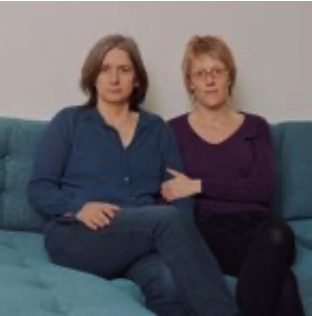
The Daily podcast (July 26, 2020) Sarah Viren: "The Sunday Read: 'The Accusation'"
GAZETTE: Broadly, are you seeing patterns or themes in the dreams you've been collecting through your survey?
BARRETT: I'm noticing big clusters of dream content. One is very literally about getting the virus — that's been a fairly common dream where the person is short of breath or spiking a fever. Or sometimes it's a little more fantastic. One woman looked down and saw blue stripes on her stomach and remembered in the dream that was supposed to be the first sign of a COVID-19 infection. Then there are metaphors for the virus — there's a big sub-cluster of bug dreams. After 9/11, I saw metaphors as well as literal dreams about those events. But I didn't see bug dreams after 9/11. And I've just seen dozens and dozens and dozens of every kind of bug imaginable attacking the dreamer: There are swarms of every kind of flying insect you've ever heard of; there are armies of cockroaches racing at the dreamer; there are masses of wriggling worms; there were some grasshoppers with vampire fangs; there are bed bugs, stink bugs.
from "What Pandemic Dreams May Come" (Harvard Gazette May 14, 2020), an interview with Deirdre Barrett, Harvard Medical School
I have had pandemic-related dreams most nights since March. They are usually about problem-solving, often trying to find my way in a strange land either with complicated pathways or complicated train systems. I am having way more dreams than before about other languages. (Two days ago I was supposed to perform on stage speaking Spanish, which I do not speak, and was learning the lines I would have to say. The next night I was in German-speaking Switzerland trying to order breakfast.), Many of my dreams are with groups of strangers. Most often, they are just mundane, long and tiring stories on loops of tedious tasks (like fixing Excel sheet entries). Last night I had such a strange dream about a wicker chair, a spider, and a flash-light with a dying battery that when I woke up I suddenly I remembered the above study I read months ago. I think, on the whole, I am not sleeping well.
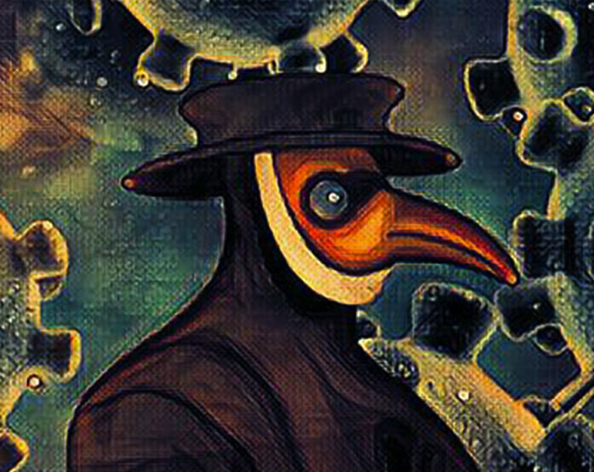
from "What Pandemic Dreams May Come" (Harvard Gazette May 14, 2020), an interview with Deirdre Barrett, Harvard Medical School. A scholar of dreams, she has created a public survey to collect the dreams related to the pandemic: here.
See also, Caity Weaver's article in the style section of the New York Times (April 13, 2020) Why Am I Having Weird Dreams Lately?
On Thursdays, I take the trash cans out to the driveway for Friday morning pickup. This is always a time to see how "nature" is doing. I feel the fresh air, sometimes hear owls or tree frogs or crickets. Sometimes the moon is out and blesses the trees. In the spring there are the night fragrances of jasmine, boxwood and such. In the summer there can be heavy, blustery fog. In the winter there can be a fine mist, actually more pleasant than the fog. ... I grew up near the earth with its little creeks and clover and a multitude of small animals we rarely see anymore. I know the smell of soil and rocks, the bitter taste of dandelions, the wallop of a wasp sting, the other-worldly sense of ozone in thunderstorm that give birth to tornadoes. But it was Japan that connected not my body with its senses but my caring heart and appreciative mind to the delicacies of natural change and, simply, natural beauty. I suppose this melding together of my childhood and professional interests is just fortuitous but perhaps we find our way to a way of living that suits us.
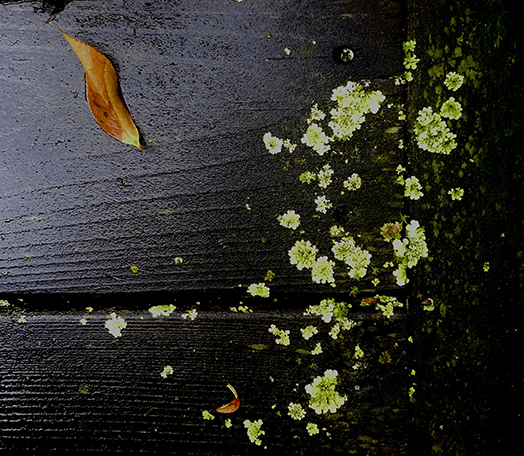
"Under May Fog" (2020)
BRYAN STEVENSON: I don't think our nation believes that the genocide of Native people is the worst thing we've ever done or slavery is the worst thing we've ever done or lynching is the worst thing we’ve ever done or even segregation. I think we've actually created a narrative that those things weren't that bad. And not only do we not need to recover from that, we don't even need to be remorseful about that. There is no shame.
BROOKE GLADSTONE: But it is the worst thing we've ever done.
BRYAN STEVENSON: It is, in fact. And, and I want the nation to have the courage to own up to that, with the knowledge that if they own up to that they won't be condemned by it, that there is something on the other side of it, which is why we do this work. I represent a lot of people who’ve done terrible things and it’s in that context that I've come to understand that we are all more than the worst thing we’ve ever done. We are more than a country that perpetrated the genocide. We’re more than a slave society. We’re more than a lynching society. We’re more than a segregation society. But we cannot ignore that bad thing we did. And there is redemption waiting, there is recovery waiting, there is reconciliation waiting. There’s something that feels more like justice than what we have experienced in America. There is something better waiting for us, without this burden, this history of racial inequality holding us down. But we can't get there through silence, by pretending that the history doesn't exist. We’ve got to own up to it.
from the transcript, "This Is Always Going To Be What Happened"
Over the past decade or two, I have become gradually more accepting of being a member of society. When I was younger, it was all about becoming something. For me, that meant looking inwards and nurturing my intensity and spirituality. I have always had a sense of responsibility and obligation, which became stronger through my engagement with Japan, or perhaps my engagement with Japan followed the pathways of responsibility. But inner exploration and development was a first priority. Perhaps beginning with my involvement with the union on campus, then later through the various pedagogical circles with which I became involved, without noticing, I was shifting within what "improvement and nurturing" meant: to do what I could to lead others in good directions. Of course teachers do that but this horizontal relationship with my society where I offered my ideas and sought to show others why I thought they would benefit "us" is something I didn't begin until my 40s. Now comes the massive events of the pandemic and real, not cosmetic, restitution. Both are social events that require not me but the "me" that is a group — whether it is the "we who live in America" or the "we who oppress while saying we do not." I cannot resolve and repair or succeed on my own. I cannot move the mountains as some sort of awesome hero. These are hand-in-hand, slow-moving, mundane but essential projects. And so, yes, "there is something better waiting for us" — if we act. It will not find fruition of its own. It is not a natural, organic evolution. It is powered by collective human choice. It makes me feel limited, frustrated, subverted. But it is the work to be done.
WNCY Studios: On the Media (December 28, 2018) "The Worst Thing We've Ever Done" https://www.wnycstudios.org/podcasts/otm/episodes/on-the-media-2018-12-28
Zen is not some kind of excitement, but concentration on our usual everyday routine. Shunryu Suzuki, Zen Mind, Beginner's Mind
Dreaming.
As a grade-schooler (and off-and-on after that) I was fascinated with the song "Over the Rainbow" (sung in the film "Wizard of Oz"). I sang it often and changed the lyrics to something I felt (then) was even more poetic.
Zen.
I studied and practiced Zen with a number of spiritual leaders. Some of these teachers wore a monk's or a nun's robes, others did not. Some I knew for years, others for less than an hour. ... Just sit. Just see. Just be. ... For me this became, "Look at reality as best you can, with as little fear as you can, with as much natural love, un-manufactured love, as you can." And so the cold wind of Zen truth is never that far away for me.
Our hybrid lives.
Speaking metaphorically, perhaps this is one way to explain the yin-and-yang of my way of being in the world: unrealistically, embarrassingly a dreamer on the one hand while; on the other, a boy who can still tremble, held in a vice-grip of unvarnished thoughts of what the world is really like but ready to accept it as a movement of fidelity or honesty or such.
In-between these, I try to live and try to love. Some days are better than others. Some efforts succeed better than others. Dreaming is my essential energy but my "too serious" is surely what tires me out, as well. Anyway, it is how I have labored to build myself, and how I want to be.
No magical thinking on this, please.
So, finally, to this simple point: Across the world, but especially in this country, far too many people are suffering because of magical thinking about an invisible challenge. It is important to dream, to be exuberant, yes. But it is important to respond with intelligence to deadly challenges. We seem unable to do so. We are willful, wishful thinkers. If a virus doesn't make us serious, will we ever be able to manage climate change? We should all worry, as the first step in looking squarely at what confronts us, each of us.
Google doodle (so gentle): Israel Kamakawiwoʻole’s 61st Birthday
Walking, taking pictures, listening to how complicated developing a vaccine can be, and learning or maybe just wanting to learn new things about tenuous, important, hope.
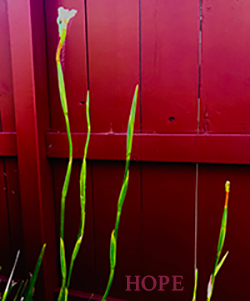
The student with a big heart and shy smile. The student who tries too hard. The student who knows the power of charm. The wise one. The student who hides its true intentions. The student puzzling over life. The student who is sooo honest. The student whose mind flies like an angel. The student of true intentions. The student pure of gaze. The student with a mountain of burdens on its shoulders. The student with the quick laugh. The student who fears the future. The student of quiet love. The student with a bright light inside. The bemused one. The student who enjoys being liked. The student who gives. The student with a mind that grips things like an iron. The royal student. The student with the look of a kind eagle. I wish them all the best. It was always a big wide world. They sail. They will be okay.
I heard on a podcast today, as I have already heard quite a few times: "Things feel different this time." And, in my mind I answer, "Yes." So, what is different? Why does "Black Lives Matter" really matter for me this time instead of a "that's important" reaction? And how do I know I'm not just joining a trend that ends? Well, if my personal history holds true, once I feel responsible for something, I don't think I've even stopped feeling responsible for that something. It isn't in my nature. And now I feel responsible, not concerned, not sympathetic, not supportive, ... responsible. And not responsible for past or current actions of other white people, but about my own actions and inactions. This arrived. I didn't invite it, I didn't seek it. But, like COVID-19, it arrived and changed my thinking. I'm not an activist, but I will find my ways to act on this sense of responsibility.
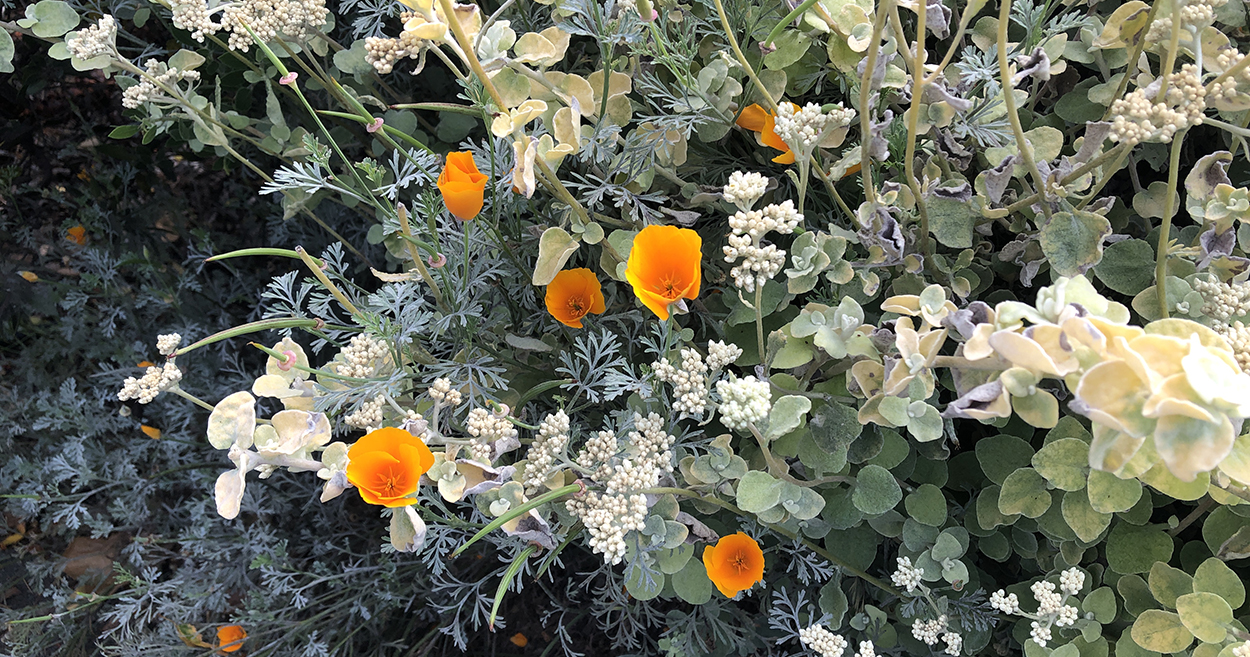
California poppies during yesterday's morning walk
I often say in my classes that history is real, that history matters and that this complicates how I think about post-modernism. I also say in my interpreting love narrative class that some memories are transpersonal, held by a cultural group not an individual but are part of the identity of that individual. Well, the logic of that leads to: I share the burden of an American white past where white people bought and enslaved black people. I share the more recent past where white domination, barred from the act of slavery, received permission from its community and found a way to continue its domination. An on-going situation. I share the crime of that and the responsibility to repair that, not just privately in an isolated way, but within my own group as well.
At right, Juneteenth, explained with clarity and honesty.
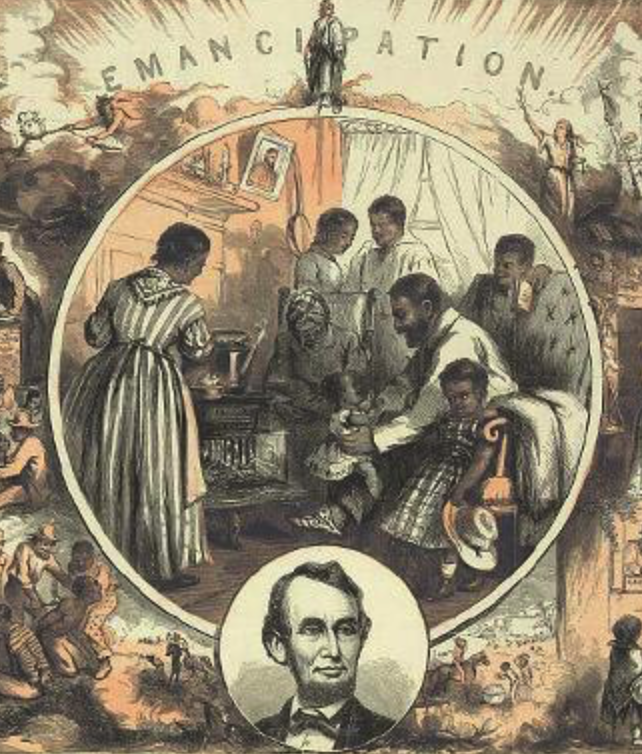
Washington Post podcast (June 19, 2020) "Why Americans don’t learn about Tulsa, or Juneteenth"
Informal musings ...
The "greater good" — finding a good that is better than other goods although it would be nice it "greater" meant "wiser."
The "greatest good" — should be finding the best good but seems to be acting in ways that serves the greatest number of people recognizing that some will be left out.
"Leaving out" — well, of course that is the peoples who are not part of the ones making the "greatest good" decisions.
"Good" — what keeps us in power and those that we have othered out of power.
Beautiful ideas tumble down the rabbit hole more often than not, in my opinion.
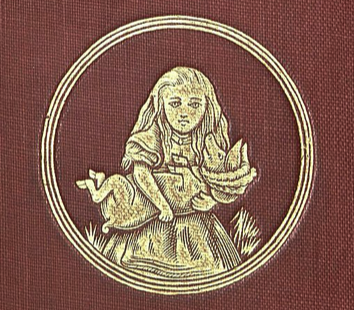
Cover of the original edition of Alice in Wonderland (1865)
"We hold these truths to be self-evident, that all men are created equal, that they are endowed by their Creator with certain unalienable Rights ..." Declaration of Independence
After decades of studying, marrying to, and being steeped in East Asian culture, the collectivist in me is quite strong. Obligation to, harmonizing with, society at its various levels, for me, usually comes first. Yet a version of this, I guess, was already instilled in me: my sister and I called it "Lecture Number 101" when my father said "The greatest pleasure in life is serving others." My mother was the daughter of a Methodist minister. For her, surely her core value was unselfish giving and that was something I saw on a daily basis. So, Christian service and East Asian collectivism—for me they dance together pretty well. But, when distilling these down to their foundational values they are oh-so-different. Collectivism arises from the practical idea that we want to live in a safe society where we can be happy and prosper. Christian service is based on the radical idea of universal love for all. But, too, because we are "all God's children" we are all precious—"created equal"—and this has unleashed boisterous, inspiring, profoundly irritating individualism.
If we do not educate our American populace we will have uneducated directions for our American society. If we do not teach science well, we will have too many citizens who laugh at science. I am an educator in a country that scoffs at the educated. Yes, sometimes it is lonely. Sometimes I am angry. More of the time I am just deeply comfortable to have chosen this path to walk.
"...fewer than 30% of [American] people under the age of 40 consider it essential to live in a democracy " Danielle Allen, director of Harvard's Edmund J. Safra Center for Ethics, Trust In American Institutions Has Been Dropping For Decades
Okay, that was a shock. But it explains why "you need to do this for your democracy" is not an argument that fairs well with many people.
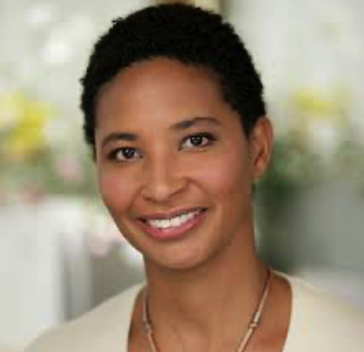
Danielle Allen, interviewed in NPR's All Things Considered, "Report: Trust In American Institutions Has Been Dropping For Decades" (June 14, 2020) https://www.npr.org/transcripts/876841905
A part of me wants white people at large to feel deeply ashamed. This is entry level. Stop killing us. This is basic. If the killing of George Floyd could unleash this tidal wave of demonstration, what was stopping you before? He's as meaningful as any other victim of police violence, named or unnamed here today. You could have harnessed all this energy 15, 20, 200, 500, 1,000 deaths ago. But that didn't happen.
And so when I ask the question, why now ["What's making white people care now?"], the truth is that I don't really care. All these white people newly attuned to this frequency the rest of us know so well. I told a friend that I wanted everyone to do their belated learning far away from me.
I don't want to see how anyone is carrying the one. I don't want to teach anyone. I have no office hours. I don't want to know what triggered your come to Jesus moment. I have no interest in seeing how the sausage gets made. I just want to rock up to the table and enjoy my breakfast.
I know what's different for me. I'm angrier now. I think of what parents say about how their hearts grow bigger after a second child, instead of having to share the love they already feel. That's me. But instead of love, it's rage. I find that this time, I am furious. That's what's different.
Bim Adewunmi, This American Life "Here, Again" — Act One
It was a voice of intelligence and sincerity.
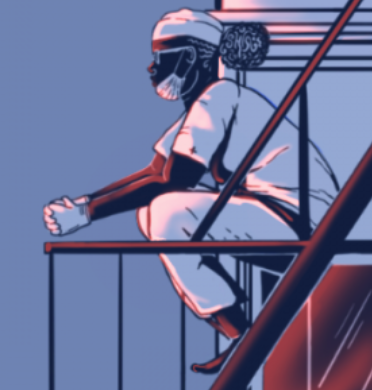
This American Life: 708: Here, Again (June 12, 2020)
https://www.thisamericanlife.org/708/here-again
The magical thinking and lack of discipline that leave the U.S. open to the a virus that kills, the apathy towards shocking daily death totals—it's profoundly unsettling. We are making a country less beautiful, more cruel, tired of soul. I think U.S. daring and its unbelievable positive attitude have brought many good things to itself and the world. This callous attitude towards devastation of some just not oneself isn't one of them.
We often like feeling powerful, we almost always like stories that energize and inspire us, we are sometimes mesmerized by Olympian feats. Gathering strength, rising with confidence — these are good for us and, I think, often end up being good for others around one.
And yet.
While I love natural vistas, honest poems, great food, acts of kindness ... hmm, I have no taste for the adrenaline of power. I love the groundedness of power but not the heady-ness of it.
So it took me a long time to discover that those who have a hunger for power can be truly, (to me) irrationally, intent on preserving and extending that power. Yes, most of us aspire to an expanse and reach of our ego. Not that—there are a few whose hearts are blackened to the core with a cruel lust for power. I have discovered this, forgotten it, and rediscovered it quite a few times in my adult years. Until I was around thirty, I was completely clueless on this point and that innocent start still even now makes me forget that it is good to beware of people obsessed with power. You cannot reason with them and they will not be kind. You are less than a one dollar bill in their eyes. They will erase you if they can. It is good to remember that, for some, power has crazed their mind and emptied their heart.
"We had a mentor years ago who said if you can get three white people with no people of color present to speak out against racism you've done revolutionary work. I didn't believe it until I tried." Suzanne Plihcik, Getting White People to Talk About Racism
"When I am in a room of white people"
In the back of my mind, I know I am among allies ... for something, for what? • I want to be liked. I don't want to be hated. I want to be in the circle. • I know that all things gained, or held on to, or confirmed is via others, even when I imagine myself as a loner, an outsider. An outsider secure in the back of his mind that he is among allies. Maybe this is an embarrassing dishonesty deep at my core. Maybe this is just what the illusion of individuality is.
The New Yorker Radio Hour: Getting White People to Talk About Racism (June 12, 2020)
A simple (as a formula) but highly resistant to a solution problem in my life for several months now: Remote teaching requires, for me, about 20-40% more time to successfully teach about 70% of what I usually would have taught. But I've reduced my work hours from about 65/week to 50/week in order to stay rested and healthy in case I become infected or my wife becomes infected and will require my care. So either I overwork and teach the 70% which is my bottom number for acceptable teaching, or I protect my body and watch the slow train of disaster as some students who are doing what they can still don't acquire enough and slide down into lower grade categories or some level of dysfunctionality. I have already designed classes to make the 70% mark work. Going below that means the complete collapse of the class, not just a further reduction. I've "budget cut" the class to the minimum. Any more and I am making fatal cuts or, in better cases, I'm just profoundly disappointed at the amount taught. This virus, in too many ways, sadly is a "no obvious solution" virus. So very small, so very disruptive.
"A friend recently told me that when she gave birth to her son, before naming him, before even nursing him, her first thought was, I have to get him out of this country. ... Though the white liberal imagination likes to feel temporarily bad about black suffering, there really is no mode of empathy that can replicate the daily strain of knowing that as a black person you can be killed for simply being black: no hands in your pockets, no playing music, no sudden movements, no driving your car, no walking at night, no walking in the day, no turning onto this street, no entering this building, no standing your ground, no standing here, no standing there, no talking back, no playing with toy guns, no living while black."
Claudia Rankine, The Condition of Black Life Is One of Mourning
For several days now a podcast keeps coming back to me: "The Condition of Black Life Is One of Mourning". It is not a "feel good by feeling sympathy" moment. It is a opening onto a new awareness, a learning of something important and a gratitude that I was taught. And, knowing this part of me, it is like an anchor around my ankles, pulling me down into an unknown. Change is underway in me that is not of "my" doing. I try to know, I try to care, and yet I am wrapped in a racist blanket of security. I am shocked at these stark, absolute blindnesses. Each time I discover a blindness there is a bit more air, a bit more health. Thank you to everyone who is trying to tell me things I need to hear. I will try to honor the gift with respect and change.
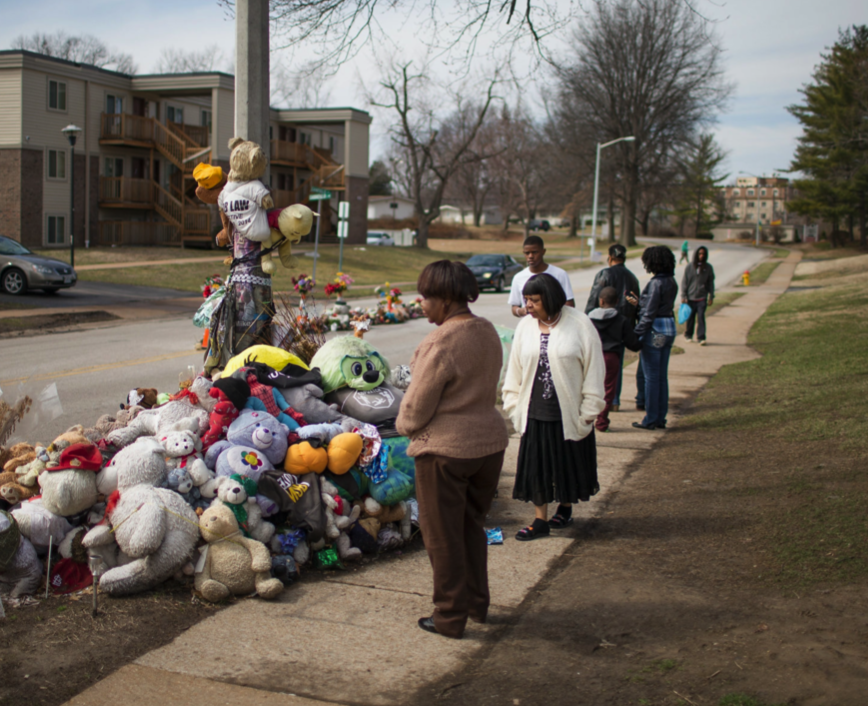
Claudia Racine, "The Condition of Black Life Is One of Mourning" New York Times Magazine June 22, 2015, accessed June 12, 2020, https://www.nytimes.com/2015/06/22/magazine/the-condition-of-black-life-is-one-of-mourning.html
So I finally begin this journal. Tired from the upside down world of COVID-19 and its horrific ravages and its cold math and its infected breath on everything and every process and every goal. Tired from the two weeks of pain in the streets, pain in a country-sized number of hearts, tired on the smallness of my personal power as I try to wiggle out of the grim grip of white privilege. Learning too much too fast while everything keeps changing even as I chase understanding, heart beating in new ways. Tired of how this weighs on my students and tired from carrying some of that weight for them. Tired of how "excellence" is now more like a heavy iron rock than a dream upon which to fly in bursts of exuberance.
I'll write privately for a while. Then, if I feel I have been authentic, I'll link out to "there."